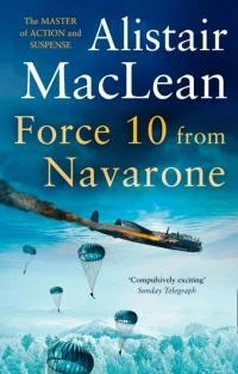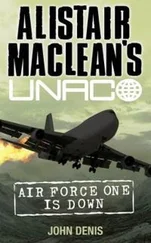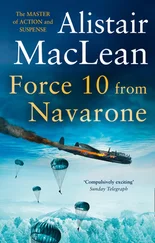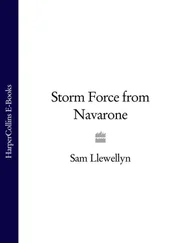Алистер Маклин - Force 10 from Navarone
Здесь есть возможность читать онлайн «Алистер Маклин - Force 10 from Navarone» весь текст электронной книги совершенно бесплатно (целиком полную версию без сокращений). В некоторых случаях можно слушать аудио, скачать через торрент в формате fb2 и присутствует краткое содержание. Год выпуска: 2011, Издательство: Sterling, Жанр: Морские приключения, на английском языке. Описание произведения, (предисловие) а так же отзывы посетителей доступны на портале библиотеки ЛибКат.
- Название:Force 10 from Navarone
- Автор:
- Издательство:Sterling
- Жанр:
- Год:2011
- ISBN:нет данных
- Рейтинг книги:4 / 5. Голосов: 1
-
Избранное:Добавить в избранное
- Отзывы:
-
Ваша оценка:
- 80
- 1
- 2
- 3
- 4
- 5
Force 10 from Navarone: краткое содержание, описание и аннотация
Предлагаем к чтению аннотацию, описание, краткое содержание или предисловие (зависит от того, что написал сам автор книги «Force 10 from Navarone»). Если вы не нашли необходимую информацию о книге — напишите в комментариях, мы постараемся отыскать её.
The guns of Navarone have been silenced, but the heroic survivors have no time to rest on their laurels. Almost before the last echoes of the famous guns have died away, Keith Mallory, Andrea and Dusty Miller are parachuting into war-torn Yugoslavia to rescue a division of Partisans ... and to fulfil a secret mission, so deadly that it must be hidden from their own allies.
Force 10 from Navarone — читать онлайн бесплатно полную книгу (весь текст) целиком
Ниже представлен текст книги, разбитый по страницам. Система сохранения места последней прочитанной страницы, позволяет с удобством читать онлайн бесплатно книгу «Force 10 from Navarone», без необходимости каждый раз заново искать на чём Вы остановились. Поставьте закладку, и сможете в любой момент перейти на страницу, на которой закончили чтение.
Интервал:
Закладка:
‘This is Maria,’ Neufeld said. ‘Maria, this is Captain Mallory.’
‘Captain Mallory.’ Her voice was soft and a little husky: she spoke in almost accentless English. ‘You are English, Captain Mallory?’
It was hardly, Mallory thought, the time or the place for proclaiming his New Zealand ancestry. He smiled. ‘Well, sort of.’
Maria smiled in turn. ‘I’ve always wanted to meet an Englishman.’ She stepped forward towards Mallory’s outstretched hand, brushed it aside and struck him, open-handed and with all her strength, across the face.
‘Maria!’ Neufeld stared at her. ‘He’s on our side.’
‘An Englishman and a traitor!’ She lifted her hand again but the swinging arm was suddenly arrested in Andrea’s grip. She struggled briefly, futilely, then subsided, dark eyes glowing in an angry face. Andrea lifted his free hand and rubbed his own cheek in fond recollection.
He said admiringly: ‘By heavens, she reminds me of my own Maria,’ then grinned at Mallory. ‘Very handy with their hands, those Yugoslavs.’
Mallory rubbed his cheek ruefully with his hand and turned to Neufeld. ‘Perhaps Petar – that’s his name–’
‘No.’ Neufeld shook his head definitely. ‘Later. Let’s eat now.’ He led the way across to the table at the far end of the room, gestured the others to seats, sat down himself and went on: ‘I’m sorry. That was my fault. I should have known better.’
Miller said delicately: ‘Is she – um – all right?’
‘A wild animal, you think?’
‘She’d make a rather dangerous pet, wouldn’t you say?’
‘She’d a graduate of the University of Belgrade. Languages. With honours, I’m told. Some time after graduation she returned to her home in the Bosnian mountains. She found her parents and two small brothers butchered. She – well, she’s been like this ever since.’
Mallory shifted in his seat and looked at the girl. Her eyes, dark and unmoving and unwinking, were fixed on him and their expression was less than encouraging. Mallory turned back to Neufeld.
‘Who did it? To her parents, I mean.’
‘The Partisans,’ Droshny said savagely. ‘Damn their black souls, the Partisans. Maria’s people were our people. Cetniks.’
‘And the singer?’ Mallory said.
‘Her elder brother.’ Neufeld shook his head. ‘Blind from birth. Wherever she goes, she leads him by the hand. She is his eyes: she is his life.’
They sat in silence until food and wine were brought in. If an army marched on its stomach, Mallory thought, this one wasn’t going to get very far: he had heard that the food situation with the Partisans was close to desperate, but, if this were a representative sample, the Cetniks and Germans appeared to be in little better case. Unenthusiastically, he spooned – it would have been impossible to use a fork – a little of the greyish stew, a stew in which little oddments of indefinable meat floated forlornly in a mushy gravy of obscure origin, glanced across at Andrea and marvelled at the gastronomic fortitude that lay behind the already almost empty plate. Miller averted his eyes from the plate before him and delicately sipped the rough red wine. The three sergeants, so far, hadn’t even looked at their food: they were too occupied in looking at the girl by the fireside. Neufeld saw their interest, and smiled.
‘I do agree, gentlemen, that I’ve never seen a more beautiful girl and heaven knows what she’d look like if she had a wash. But she’s not for you, gentlemen. She’s not for any man. She’s wed already.’ He looked at the questioning faces and shook his head. ‘Not to any man. To an ideal – if you can call death an ideal. The death of the Partisans.’
‘Charming,’ Miller murmured. There was no other comment, for there was none to make. They ate in silence broken only by the soft singing from the fireside, the voice was melodious enough, but the guitar sounded sadly out of tune. Andrea pushed away his empty plate, looked irritably at the blind musician and turned to Neufeld.
‘What’s that he’s singing?’
‘An old Bosnian love song, I’ve been told. Very old and very sad. In English you have it too.’ He snapped his fingers. ‘Yes, that’s it. “The girl I left behind me”.’
‘Tell him to sing something else,’ Andrea muttered. Neufeld looked at him, puzzled, then looked away as a German sergeant entered and bent to whisper in his ear. Neufeld nodded and the sergeant left.
‘So.’ Neufeld was thoughtful. ‘A radio report from the patrol that found your plane. The tanks were empty. I hardly think we need await confirmation from Padua, do you, Captain Mallory?’
‘I don’t understand.’
‘No matter. Tell me, have you ever heard of a General Vukalovic?’
‘General which?’
‘Vukalovic.’
‘He’s not on our side,’ Miller said positively. ‘Not with a name like that.’
‘You must be the only people in Yugoslavia who don’t know him. Everybody else does. Partisans, Cetniks, Germans, Bulgarians, everyone. He is one of their national heroes.’
‘Pass the wine,’ Andrea said.
‘You’d do better to listen.’ Neufeld’s tone was sharp. ‘Vukalovic commands almost a division of Partisan infantry who have been trapped in a loop of the Neretva river for almost three months. Like the men he leads. Vukalovic is insane. They have no shelter, none. They are short of weapons, have almost no ammunition left and are close to starvation. Their army is dressed in rags. They are finished.’
‘Then why don’t they escape?’ Mallory asked.
‘Escape is impossible. The precipices of the Neretva cut them off to the east. To the north and west are impenetrable mountains. The only conceivable way out is to the south, over the bridge at Neretva. And we have two armoured divisions waiting there.’
‘No gorges?’ Mallory asked. ‘No passes through the mountains?’
‘Two. Blocked by our best combat troops.’
‘Then why don’t they give up?’ Mallory asked reasonably. ‘Has no one told them the rules of war?’
‘They’re insane, I tell you,’ Neufeld said. ‘Quite insane.’
At that precise moment in time, Vukalovic and his Partisans were proving to some other Germans just how extraordinary their degree of insanity was.
The Western Gap was a narrow, tortuous, boulder-strewn and precipitously walled gorge that afforded the only passage through the impassable mountains that shut off the Zenica Cage to the east. For three months now German infantry units – units which had recently included an increasing number of highly-skilled Alpine troops – had been trying to force the pass: for three months they had been bloodily repulsed. But the Germans never gave up trying and on this intensely cold night of fitful moonlight and gently, intermittently falling snow, they were trying again.
The Germans carried out their attack with the coldly professional skill and economy of movement born of long and harsh experience. They advanced up the gorge in three fairly even and judiciously spaced lines: the combination of white snow suits, of the utilization of every scrap of cover and of confining their brief forward rushes to those moments when the moon was temporarily obscured made it almost impossible to see them. There was, however, no difficulty in locating them: they had obviously ammunition and to spare for machine-pistols and rifles alike and the fire-flashes from those muzzles were almost continuous. Almost as continuous, but some distance behind them, the sharp flat cracks of fixed mountain pieces pinpointed the source of the creeping artillery barrage that preceded the Germans up the boulder-strewn slope of that narrow defile.
The Yugoslav Partisans waited at the head of the gorge, entrenched behind a redoubt of boulders, hastily piled stones and splintered tree-trunks that had been shattered by German artillery fire. Although the snow was deep and the east wind full of little knives, few of the Partisans wore greatcoats. They were clad in an extraordinary variety of uniforms, uniforms that had belonged in the past to members of British, German, Italian, Bulgarian and Yugoslav armies: the one identifying feature that all had in common was a red star sewn on to the right-hand side of their forage caps. The uniforms, for the most part, were thin and tattered, offering little protection against the piercing cold, so that the men shivered almost continuously. An astonishing proportion of them appeared to be wounded: there were splinted legs, arms in slings and bandaged heads everywhere. But the most common characteristic among this rag-tag collection of defenders was their pinched and emaciated faces, faces where the deeply etched lines of starvation were matched only by the calm and absolute determination of men who have no longer anything to lose.
Читать дальшеИнтервал:
Закладка:
Похожие книги на «Force 10 from Navarone»
Представляем Вашему вниманию похожие книги на «Force 10 from Navarone» списком для выбора. Мы отобрали схожую по названию и смыслу литературу в надежде предоставить читателям больше вариантов отыскать новые, интересные, ещё непрочитанные произведения.
Обсуждение, отзывы о книге «Force 10 from Navarone» и просто собственные мнения читателей. Оставьте ваши комментарии, напишите, что Вы думаете о произведении, его смысле или главных героях. Укажите что конкретно понравилось, а что нет, и почему Вы так считаете.











